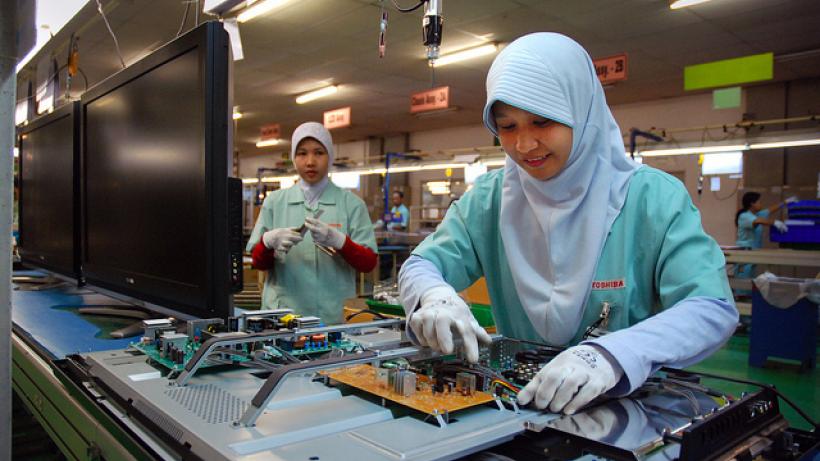
IGC Quick Clicks: How will technology impact the future of work?
Did you know that once upon a time in the UK there was a designated person, often a night watchman or ‘knock upper’, to wake people up every morning? Then came alarms and two centuries later, mobile phones – with them the job of ‘knock upper’ died. These and many other ‘machines’ have slowly made previously staple jobs redundant. Technology has been changing the nature of our society since time immemorial. However, today there is a growing fear that automation could destroy jobs at an unprecedented scale. This post collates evidence from different quarters to see if we have anything to fear.
Technology is but a tool created by humans and how we use it will determine whether the impact will be disruptive or improve society. It can be harnessed to bridge inequality and poverty gaps, create a level playing field, and support inclusive development, or could increase unemployment, exacerbate societal divisions, and reduce net welfare.
What can we learn from the past?
All around us we see technology changing our lives. Chatbots have infiltrated customer service, Netflix is drawing filmgoers away from cinema halls, ATMs are reducing the need for bank tellers, and now, Swedes are inserting microchips under their skin which over time will make bank cards, keys and physical tickets passé. Yet some would argue that when one door closes, another opens. Do different job opportunities arise to balance out the job market?
We can learn a lot from studying previous automation trends and their impacts. The biggest technology-induced change in jobs was seen during the Industrial Revolution. Looking at the impact of steam engines during this period, research finds that one engine per 2,500 persons led to a 13 percentage point decline in the share of unskilled workers. Further, Daron Acemoglu and Pascual Restrepo look at the effects of an increase in industrial robots on human labour in the US from 1990 to 2007 (also available as a VoxEU podcast). They find that one more robot per 1,000 workers reduced wages by 0.25% - 0.50%. In this VoxDev article, they go on to say that if rapid automation leads to more opportunities in the form of complex tasks for humans, the effects could be balanced out. Also, if many jobs are lost rapidly, history (namely the Swinging Riots of 1830-32) tells us it is unlikely that people will stand by silently. The reason for this is not that humans are opposed to technological progress, but that they do not want to become redundant in the absence of retraining schemes. To understand more, you can read this article on the misconceptions of Luddites* and their relevance today.
What should we expect in the future?
Today, the scale and speed of developments in artificial intelligence, machine learning, and robotics are unparalleled. MIT Technology Review rounds up all estimates they could find ((phew!) of the number of jobs automation would create and destroy. The table summarising the results is copied below. As is evident, no one agrees on a number! Whilst this doesn’t help quell our fears, it isn’t surprising because how we harness technology will determine the impact it has on us. Some experts believe we are overreacting and being simplistic – automation will redesign, not reshape, our working lives. However, if robots can replace, and not just displace, humans, net jobs will be lost. Even that might not be a bad thing, as Robert Skidelsky opines. It could mean that we have increased productivity along with decreased working hours, stabilised or increased wages, and expanded leisure time. Similarly, Jeffrey Sachs believes that appropriate fiscal policy machines will enable greater productivity and more leisure time.
 Source: MIT Tech Review
Source: MIT Tech Review
Note: This value is Technology Review's extrapolation based on a percentage of jobs lost or gained given in the report. The percentage was converted to number based on the number of jobs in the US when the prediction was made according to the BLS.
Who are the winners and losers?
Nonetheless, automation is bound to bring about a shift in labour structure, and the impacts will vary significantly by sector. Jobs which require basic cognitive skills are likely to be easily automated. McKinsey Global Institute has an article and a report on who should start thinking about a career shift and to which profession. Along with new jobs, technology could also create more inclusive development. Studies have shown that mobile money has led to the empowerment of women and that technology is transforming access to quality education and healthcare in remote areas. These innovations will increase the welfare of marginalised groups, as well as provide them with an opportunity to overcome some of the hurdles to entering the job market.
How will developing countries be affected?
So far we have looked at the global impact of automation. Developing countries – where two-thirds, or 1.8 billion members of the world’s labour force, live – have a significantly different economical and labour structure to developed ones. Developing countries are generally characterised by labour-intensive, agrarian and industrial (as opposed to service-oriented), and lower skilled jobs. This could render them more susceptible to automation in a closely linked global economy, argue some.
Lukas Schlogl and Andy Sumner predict that automation will lead a push of labour into the service sector, leading to wage stagnation but not mass unemployment in developing countries. This could cause a rise in inequality, something we need to carefully plan against to ensure that technology is used to bridge existing divides and not expand rifts. To this end, the World Bank recommends that we ‘invest in people, especially in health and education, to harness the benefits of technology and to blunt its worst disruptions.’ The Pathways Commission also released a comprehensive report on the myths of automation and how developing countries should use technology for inclusive growth. Regulation will be key. Many have also started thinking about universal basic income as the antidote to the loss of jobs and wages to automation.
There are also those sceptical that technology will effect monumental change. Stefan Dercon argues this case in an Oxfam blog. As affordable labour is available in emerging economies and high initial investment often needed in technology, it is possible that developing countries will not be hit by automation at the same pace as the developed world. An example of automation used in the developed world is that of e-toll machines. However, despite the availability of this technology, many developing countries still choose to have manned toll booths.
If you are curious to engage more with this topic, you can join the IGC’s public lecture on 6th November, How will technology impact the future of work in developing countries? If you won’t be able to make it, you can listen to the podcast of the event shortly after.
*Luddites: Bands of English workers who destroyed machinery, especially in cotton and woollen mills, which they believed was threatening their jobs (1811–16)
Editor’s Notes: Thank you to Thomas Hill for his insightful suggestions. This blog post is linked to the LSE Festival: New World (Dis)Orders.


